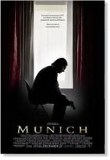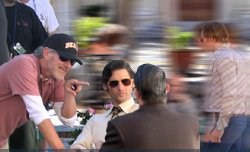 Critics
You never want to be labeled a fan of Israel in today’s Hollywood.
Mimi Weinberg: With Jews like Spielberg we don't need enemies.
Gila Almagor says thriller about Israeli assassinations of Munich 1972 massacre perpetrators will improve country's image.
Spielberg tells Time Magazine ahead of release of upcoming movie about Munich Olympic massacre.
Interviews
Audiences will be challenged by the complex moral issues that it raises.
"We're all kind of directly responsible for you know, most of the pain that goes on in this world."
Reviews
One thing critics agree on about Steven Spielberg's Munich: it will give audiences something more than popcorn to chew on.
A film of uncommon depth, intelligence, and sensitivity, Munich defies easy labeling.
As Steven Spielberg ponders the pointlessness of tit-for-tat retaliation between Israelis and Palestinians...
Steven Spielberg successfully enters Costa-Gavras territory with "Munich".
For aspiring Israeli actor Guri Weinberg, the big break in Hollywood was mixed with heartbreak.
|
 Hollywood Reporter: Film can address the ethics of counterterrorism
Steven Spielberg successfully enters Costa-Gavras territory with "Munich," a thought-provoking, highly charged inquiry into the political, moral and historical ramifications of terrorism and the effort to combat this scourge. While "Munich" does not lack for action and intrigue -- indeed it brims with it -- Spielberg deliberately mutes the tone of these events so the film can address the ethics of counterterrorism, in this case assassinations.
The problem faced by Universal Picture, which co-produced the film with DreamWorks and will distribute, is twofold: On the domestic side, the company must market "Munich," a film without stars, as a Spielberg film, yet it's the least Spielbergian film he has ever made. Secondly, overseas marketing must counter suspicions that a controversial film about terrorism made by an American Jewish director will have an anti-Palestinian bias. It doesn't, but we're talking about perceptions here.
The film mostly concerns the aftermath of the terrifying hostage taking and murder of 11 Israeli athletes at the 1972 Munich Olympics. The story, written by Tony Kushner and Eric Roth (based on the book "Vengeance" by George Jonas), follows the somewhat fictionalized efforts of a secret team of five Israelis stationed in Europe to track down and kill 11 Palestinians suspected of planning the Munich attack. The Munich event itself is doled out in dark, gritty flashbacks throughout the movie, but these are seen as a recurring nightmare that drives and haunts the unit's leader.
Eric Bana plays Avner Kauffman, a Mossad officer and former bodyguard to Israeli Prime Minister Golda Meir. He is personally selected by Meir (Lynn Cohen in a fine impersonation) to lead the assassins. So great is the secrecy that he must resign his position, virtually abandon his pregnant wife (Ayelet Zurer) and operate beyond the knowledge and supervision of his bosses, particularly the morally equivocating hard-ass Ephraim (Geoffrey Rush).
The team is a surprisingly motley crew. Grimly determined South African hit man Steve (Daniel Craig) is maybe too eager to kill. Meticulous Belgian toymaker Robert (Mathieu Kassovitz) has the task of assembling bombs. The German-Jew Hans (Hanns Zischler), whose cover is an antique dealer, proves an excellent forger of documents. Cleanup man Carl (Ciaran Hinds) must worry that targets are clean and no collateral damage ensues.
At first, the movie takes place in the familiar movie world of international intrigue and revenge melodrama. Gradually, though, an unease fills the scenes of the team shadowing and liquidating their prey. The victims are not what one might expect: a scholarly writer in Rome, who translates Arab literature into Italian a dignified professor in Paris, living a comfortable bourgeois life with his family. The realization hits some of the killers that no one has seen one iota of proof that these targets had anything to do with Munich.
Certainly, no one today needs reminding how government assurances and intelligence can prove woefully wrong if not disingenuous. Indeed a new book about Israel's revengeful response to Munich claims the Israelis largely got the wrong men.
"All this blood comes back to us," complains one assassin. The unintended consequence for these men is that they are now haunted by their own bloody deeds. Worse, with these illegal acts, one argues, Israel loses its sense of righteousness. How can anyone now tell them apart from their enemies?
There is even another price. For every death, Black September, the terrorist group behind Munich, strikes back with acts often more horrific, at least in terms of body count, than Munich. Finally, the hunters find themselves among the hunted as members of Avner's team are killed one by one.
Political context comes in a telling sequence in which Avner, in his pose as a European communist, discusses the Palestinian issue with a Palestinian terrorist, who is unaware of Avner's true identity. In this calm discussion, it becomes evident that two tribes claim the same land with equal passion and that each has genuine grievances against the other. Each is willing to answer acts of violence with more acts of violence, perpetuating a deadly cycle that will never cease without the intercession of peacemakers, a group in short supply in the Middle East, then and now.
One fascinating aspect to the group's tracking down targets is their total reliance on a shady French contact, Louis (Mathieu Amalric). He along with his deceptively affable father (Michael Lonsdale) are equal-opportunity buyers and sellers of information. It takes awhile for Avner to realize that nothing prevents this charming family from selling out his team.
Spielberg stages the killings to maximize suspense without resorting to elaborate cinematic tricks. Killings and gunfights are messy, even botched. Characters are ordinary mortals with little emphasis on heroics. Avner's primary concern is a wife and daughter, whom he has spirted out of Israel to Brooklyn so he can visit them occasionally.
Locations in various countries are kept matter of fact rather than exotic. Cinematographer Janusz Kaminski's smooth, retro style moves the film into darker, more disturbing colors as the killings continue. Designer Rick Carter never shows off period details. Michael Kahn's editing builds suspense in the individual sequences in a Hitchcockian manner as John Williams' muted score quickens the pulse.
The film ends as two men part ways in Brooklyn. The towers of the World Trade Center dominate the skyline behind them.
- By Kirk Honeycutt, Hollywood Reporter.
|
|